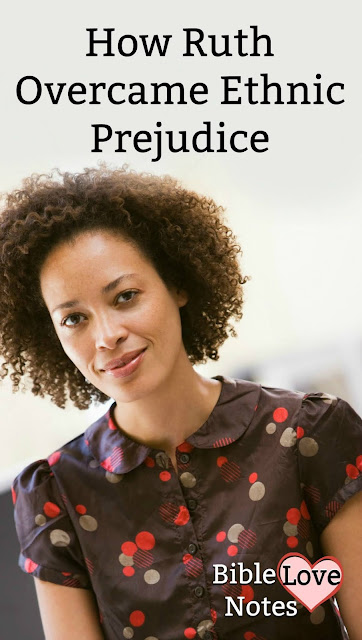Ruth’s story (Ruth 1-4) offers some wonderful lessons. She stood firm in her faith against great odds (see Ruth Beat the Odds).
She also overcame ethnic prejudice.
Moab, Ruth's homeland, was a pagan nation and a long-time enemy of God's people.(1)
When she returned to Judah with Naomi, Ruth would have been seen as a pagan Gentile with questionable character.(2)
But Ruth kept focused on God's will, not unjust prejudice, and she proved herself.
When Boaz met Ruth, he’d already heard about her faith, her kindness to Naomi, and her sacrifice in coming to Judah (Ruth 2:11). Her godly attitudes were the “talk of the town.” She’d become known as “a woman of noble character” (Ruth 3:11). Naomi’s friends thought Ruth was “better than seven sons” (Ruth 4:14-15).(3)
We won't always win over our critics, but we'll keep our souls healthy by focusing on God's will, not prejudice (Colossians 3:23).
🎔🎔🎔🎔🎔🎔🎔🎔🎔🎔🎔
Footnotes:
(1) The Moabites were descendants of the son born from the incestuous relationship between Lot and his daughter (Genesis 19:30-38).
From the beginning, the Moabites were a troublesome lot (excuse the pun), a constant problem for the Israelites. When the Israelites fled from Egypt, the Moabites would not sell them water or food and refused to let them pass through their land (Deuteronomy 23:3-4).
During the time of the Judges, the Moabites repeatedly oppressed Israel (Judges 3:12-30; Judges 11:17). Read more: Moab.
(2) Jews were taught to resist all paganism and were forbidden to marry pagan wives and intermingle with pagan people. But God expected believing foreigners to be treated the same as Jews. Leviticus 19:34 says: "The foreigner residing among you must be treated as your native-born. Love them as yourself, for you were foreigners in Egypt. I am the LORD your God."
Sadly, foreigners typically were not accepted in this way. And Ruth would have dealt with prejudice, suspicion, and skepticism because she was a Moabite.
(3) Ruth understood the prejudice she faced, and she responded to it in humility. When Boaz treated her favorably in his field, "she bowed down with her face to the ground. She asked him, 'Why have I found such favor in your eyes that you notice me--a foreigner?'" (Ruth 2:10) Boaz was a man of God, and he knew Ruth had forsaken her pagan gods (Ruth 2:12). He treated her with the respect required in Leviticus 19:34.
Bible Love Notes




No comments:
Post a Comment